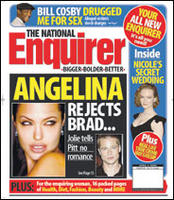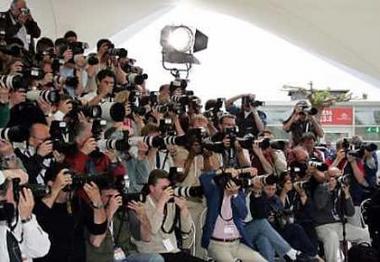 Cartoon courtesy of T-ShirtHumor.com - [Eating crow for not admitting Cruise trying to crazily think out of the "on message" box -- pass the tabasco, please!] As for Mission Impossible #3, Tune in Tomorrow....
Cartoon courtesy of T-ShirtHumor.com - [Eating crow for not admitting Cruise trying to crazily think out of the "on message" box -- pass the tabasco, please!] As for Mission Impossible #3, Tune in Tomorrow....###
I am a PR Rep and PAO. (SEE: (blogs): highvizpr,abbebuckpr, abbebuckpublicaffairs); Twitter). YES, politics + info-tainment are ruling the day; W/ micro-blogging speeding the process of plow and share ten-fold, I share PR POV right here, welcoming all Q & A. To find out more about my line, "GOOGLE" (of course!)/ get in touch. (Still) TOPICAL QUOTE: "We are living in an age of Publicity" -Will Rogers (1924) ~~(Some things just never change!) # # #
 Cartoon courtesy of T-ShirtHumor.com - [Eating crow for not admitting Cruise trying to crazily think out of the "on message" box -- pass the tabasco, please!] As for Mission Impossible #3, Tune in Tomorrow....
Cartoon courtesy of T-ShirtHumor.com - [Eating crow for not admitting Cruise trying to crazily think out of the "on message" box -- pass the tabasco, please!] As for Mission Impossible #3, Tune in Tomorrow.... {{{Come on, you love it, don't you? Admit it! ESCAPISM! Live vicariously - no, wait, YOU can be the diva!}}}
{{{Come on, you love it, don't you? Admit it! ESCAPISM! Live vicariously - no, wait, YOU can be the diva!}}}Reporters Eye Blogs
Published: June 27, 2005
A new study shows that while journalists may not see blogs as highly credible, they read them.
Most journalists use blogs to do their work, even though only 1% believe blogs are credible, according to a survey by Euro RSCG Magnet done in partnership with Columbia University.
The study finds that more than half of journalists use Weblogs regularly, with 28% relying on them for day-to-day reporting. By comparison, the Pew Internet and American Life Project reports that only 5% of the online population reads blogs regularly.
"The findings of the study validate what we have known for some time: that blogs are playing a more significant role in the way information is transmitted to readers and journalists alike, and may profoundly alter the media and communications landscapes," said Aaron Kwittken, CEO of Euro RSCG Magnet. "The fact that the media are using blogs for reporting and research also demonstrates that blogs have an enormous potential to not only influence the general public, but to influence the influencers — journalists and the media — as well."
The study finds that some 70% of journalists who use blogs do so for work-related tasks. Most often, those work-related tasks involve finding story ideas, with 53% of journalist respondents reporting using blogs for such purposes. But respondents also turn to blogs for other uses, including researching and referencing facts (43%) and finding sources (36%). Fully 33% of journalists say they use blogs as a way of uncovering breaking news or scandals.
"As blogs continue to gain in popularity, quality and influence, it is becoming imperative that journalists and journalism students continue to integrate blogs, especially blogs that cover technology, into their reporting practices," said Steven S. Ross, associate professor at Columbia University and a partner in the study.
Although many journalists use blogs, few post to blogs or publish their own. The report noted that such activities might be seen as compromising a journalist's objectivity and credibility — not to mention that reporters are paid to write, so writing for free might not be a good career choice.
Other highlights of the study include:
> 45% of journalists are less trusting of the professional behavior of their own colleagues — up from 34% in 2003.
> 93% note that they are less trusting of colleagues who are paid to act as spokespeople.
> 79% believe that recent revelations about journalists taking payment from third parties has had a strong effect on media credibility.
> 78% believe that Rathergate has profoundly altered the media's credibility.
> 93% of journalists said they are being "excruciatingly careful" in fact-checking their stories in 2005 — a huge increase from 59% in 2003, likely a reflection of the press's declining credibility.
Journalists agreed that Weblogs have a healthy future in the coming year for spreading information on the corporate level and functioning as watchdogs: 68% of them say blogs will become a more popular tool for corporations seeking to inform consumers, while 56% agree that blogs will remain an independent and unorthodox means of disseminating information.
For an in-depth look at how blogs are being used by corporate America, read eMarketer's The Business of Blogging report.
###
 Reuters - Mon Jun 27,11:38 AM ET
Reuters - Mon Jun 27,11:38 AM ET